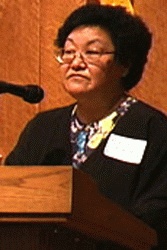|
Jack Zayan: Thank you, Barbara. Our next speaker is Marie Nash.
 |
| Marie Nash |
 |
Marie Nash: Thank you for inviting me to deliver his message to all of you. I would like to thank the organizing committee for putting on this wonderful event in this wonderful location where we can all celebrate our culture.
While Barbara talked about the future, I’m going to read the words from Senator Stevens regarding the past and history of his participation in ANCSA:
"When you read the long and sordid history of American Indian law, a trail of broken promises, the Alaska Native Claims Settlement Act is noted as the beginning of the Self Determination Era -- policy set by Native people for Native people. It was the only legislatively settled group of claims, and it established systems and entities that have been formed by and managed by the beneficiaries of the settlement. The act, despite some of its flaws and failings, is still the most generous settlement of aboriginal land claims in the history of the world.
“Settling these claims became a matter of conscience for me while working on the Alaskan statehood bill in 1956 and 1957. I conferred with Laverne Madigan, the executive director of the American Association of Indian Affairs, Howard Rock, Doctor Forbes and others. Before the act, Native people had only a right to occupy land in which they lived. They held legal title to almost no land, and faced the prospect of long, costly litigation with no guarantee of success.
“Later, as a lawyer in Anchorage, I participated in some of those early claims on a pro bono basis, handling the Minto land claims case for free because I shared their vision for the future. When I became a senator a few years later, on Christmas Eve of 1968, the claims act was my first major legislative initiative. Today, it remains one of the accomplishments of which I am most proud.
“After the act, Alaska Natives became the largest private landowners on the globe, controlling 44 million acres -- an area the size of Rhode Island, Connecticut, Delaware, New Hampshire, Vermont, Hawaii, Massachusetts, New Jersey and West Virginia – and the federal government and State of Alaska paid one billion dollars in addition to the land conveyed.
“Before the act, none of the state’s largest corporations were owned, controlled or operated by Native people. Today, nearly a third of the top 49 companies in the state have their roots in ANCSA. A few have even made it to the national Fortune 500, an accomplishment beyond our wildest dreams back in 1971.
“The act has not yet solved every problem, but it could not. We continue to work together to solve many difficult problems facing Native people -- from honey buckets to alcohol abuse. The act remains strong, and where it has not worked, we have amended it. We continue to use the act’s framework to create new, exciting opportunities for Native entrepreneurs -- from government contracts to a role in the nation’s telecommunications network.
“I wish I could be there with you in person to mark this special occasion and visit with old friends. Katherine and I send our warmest wishes and hope to be in Alaska to celebrate the holidays in our home. Thank you.”
|




